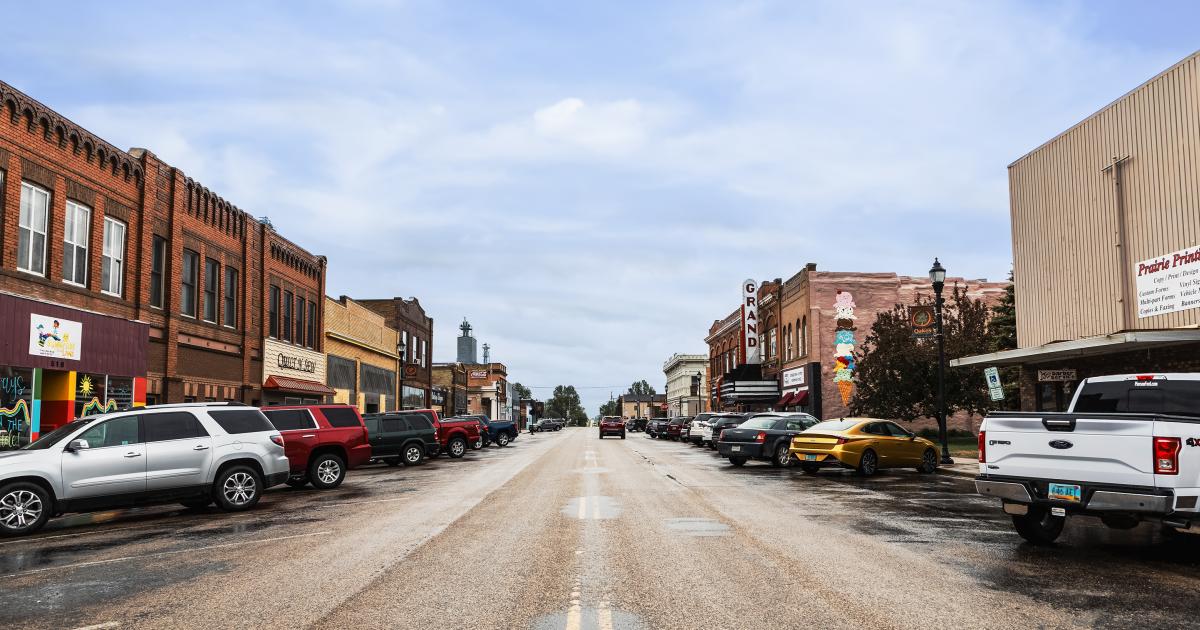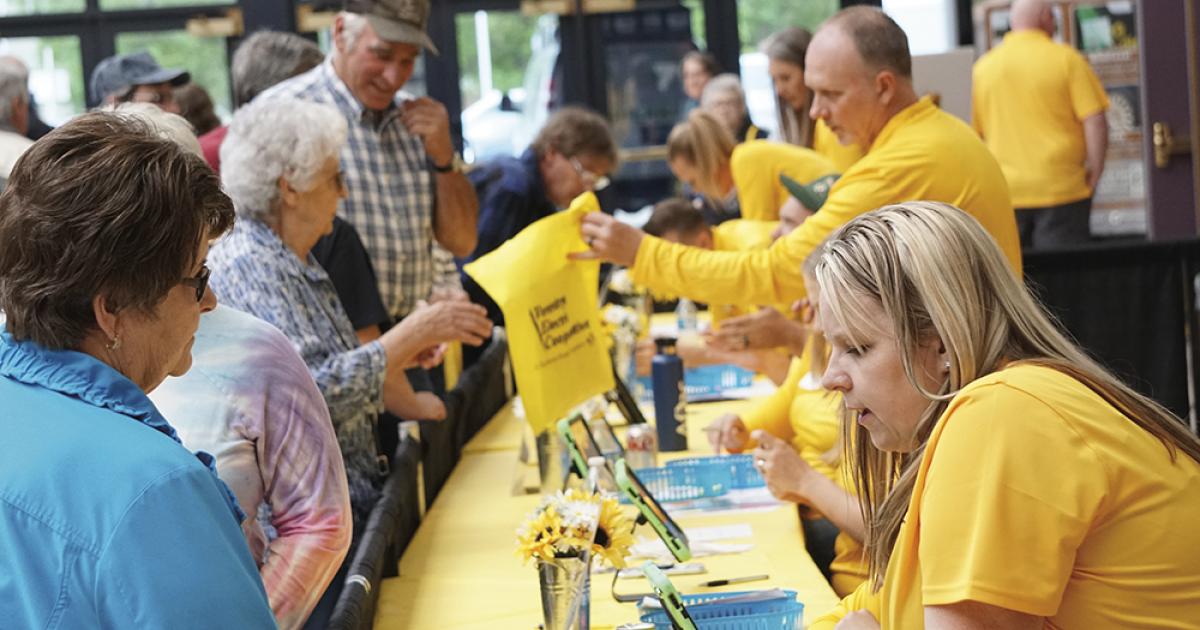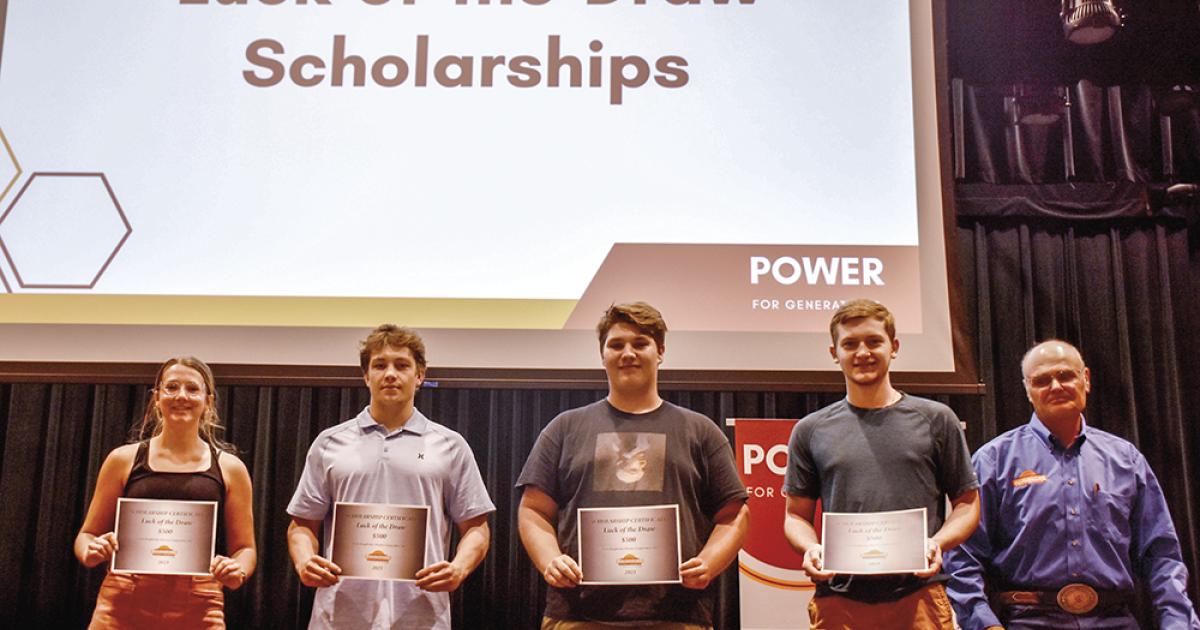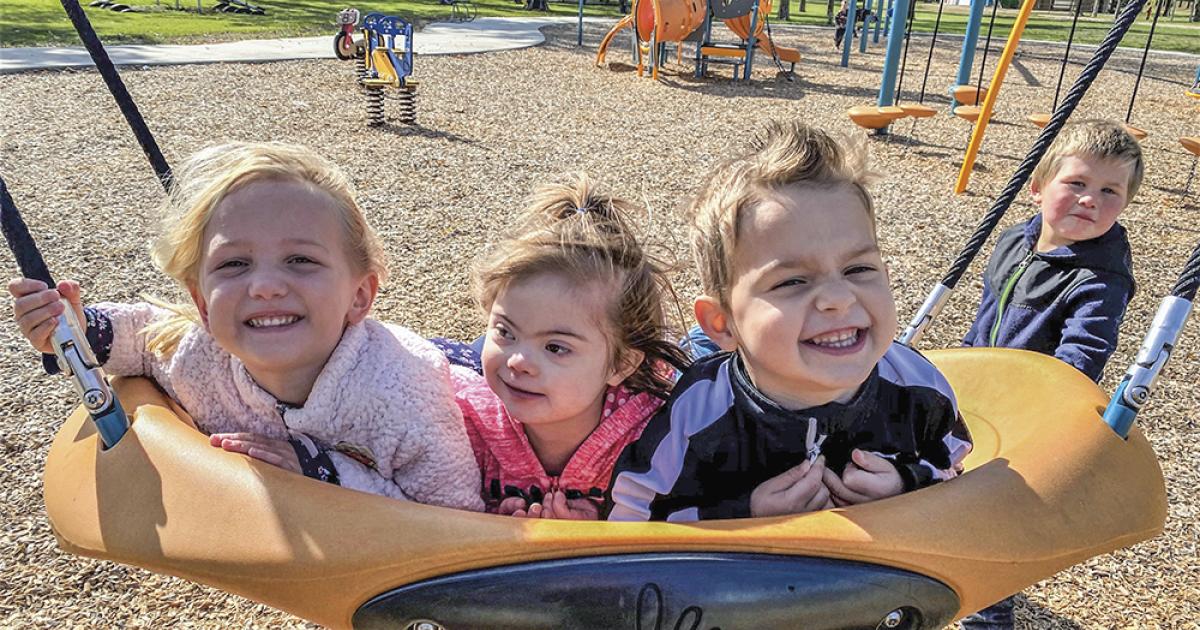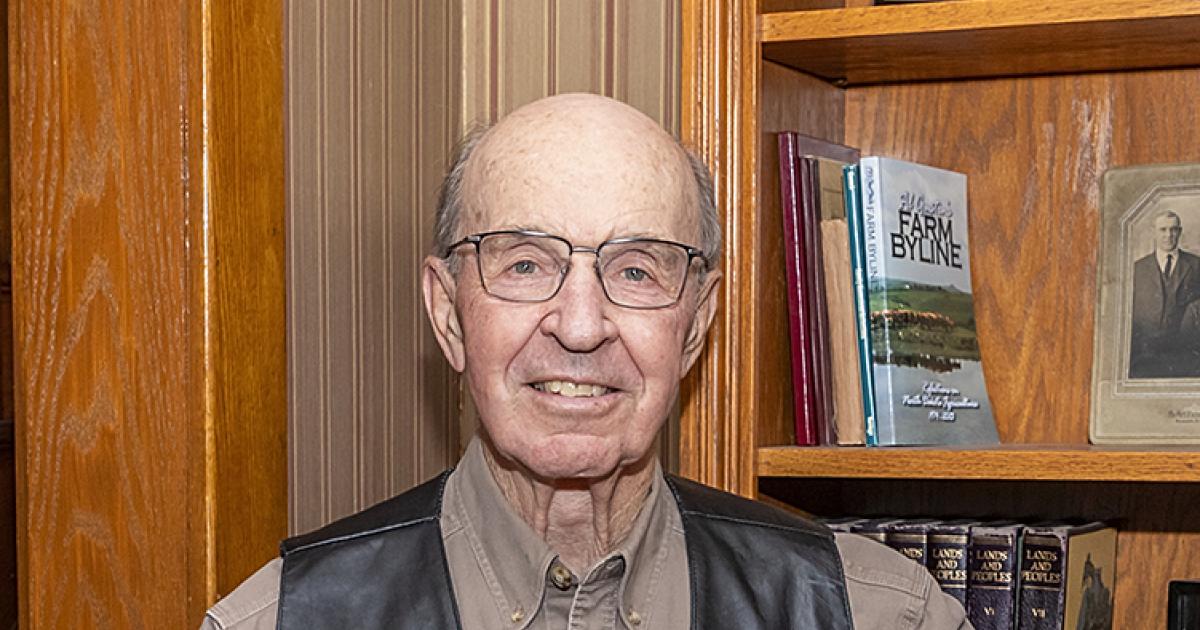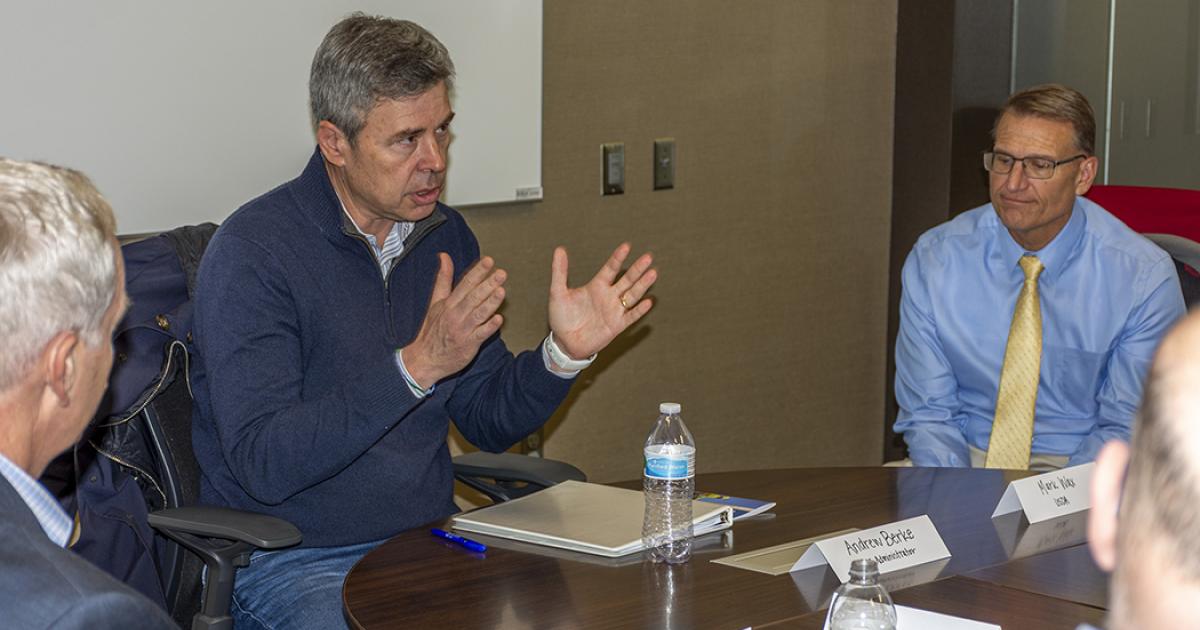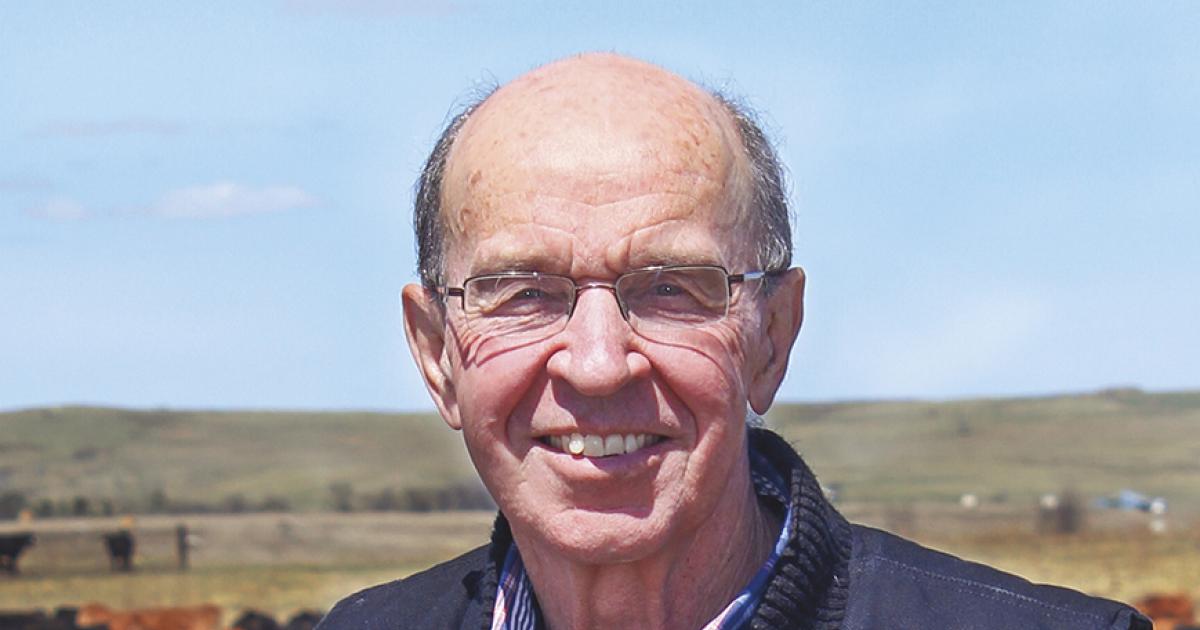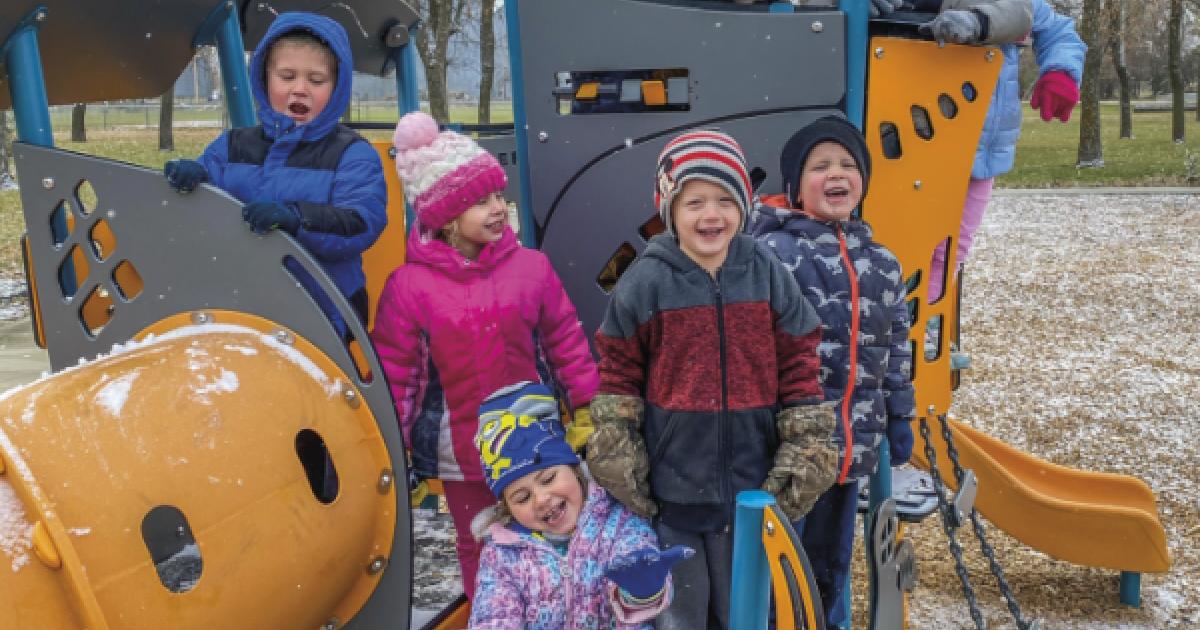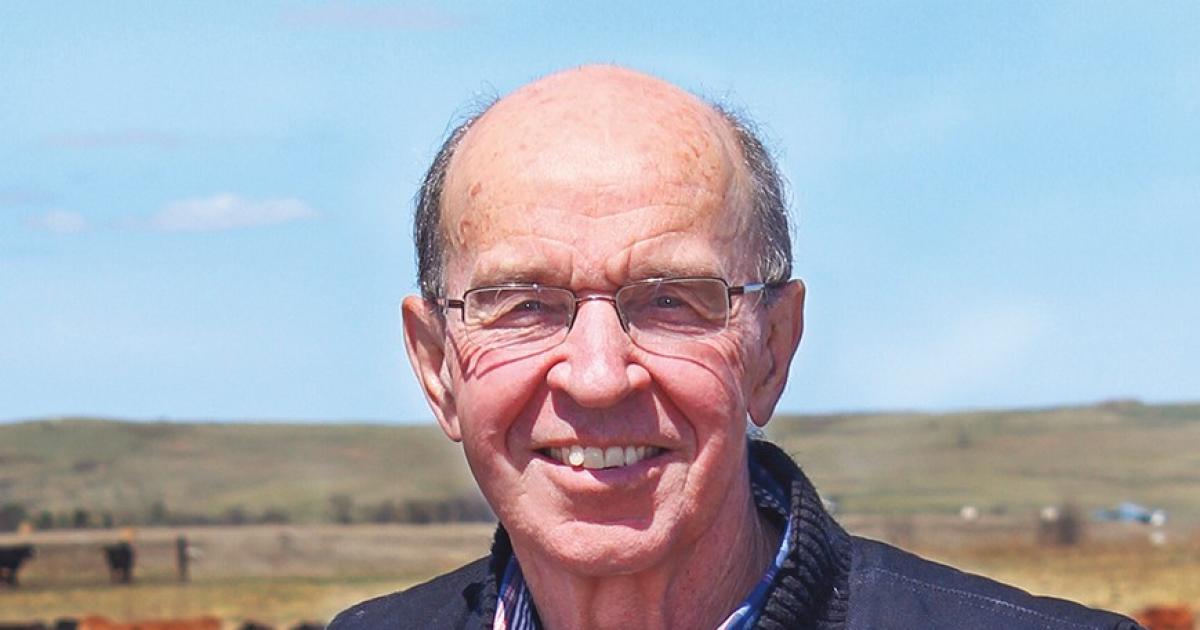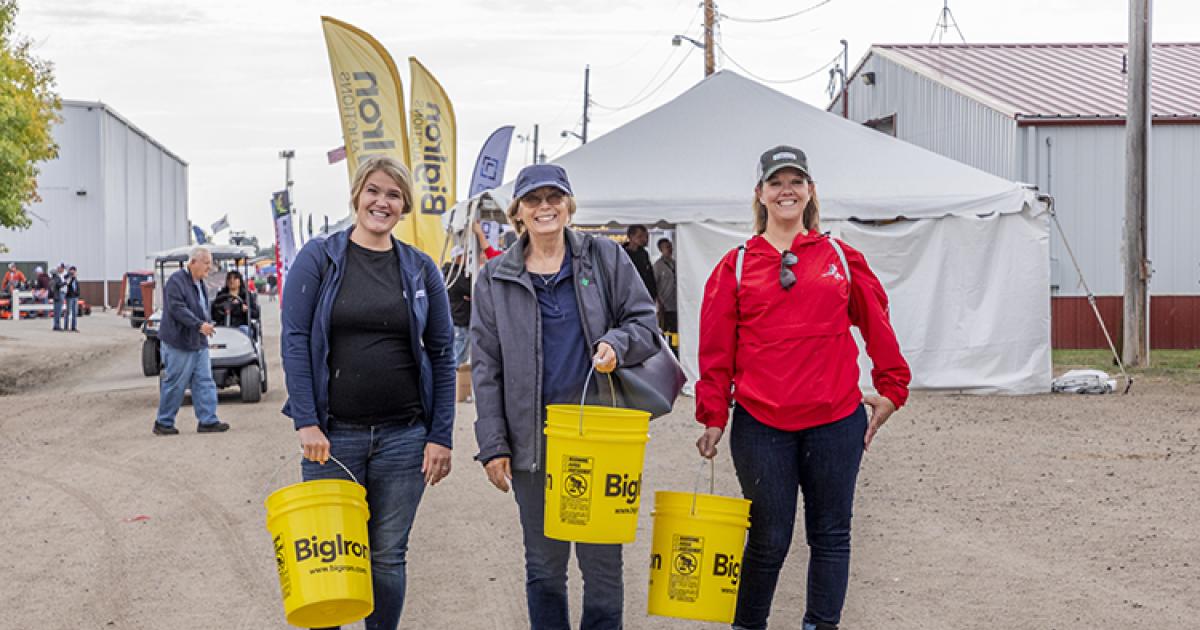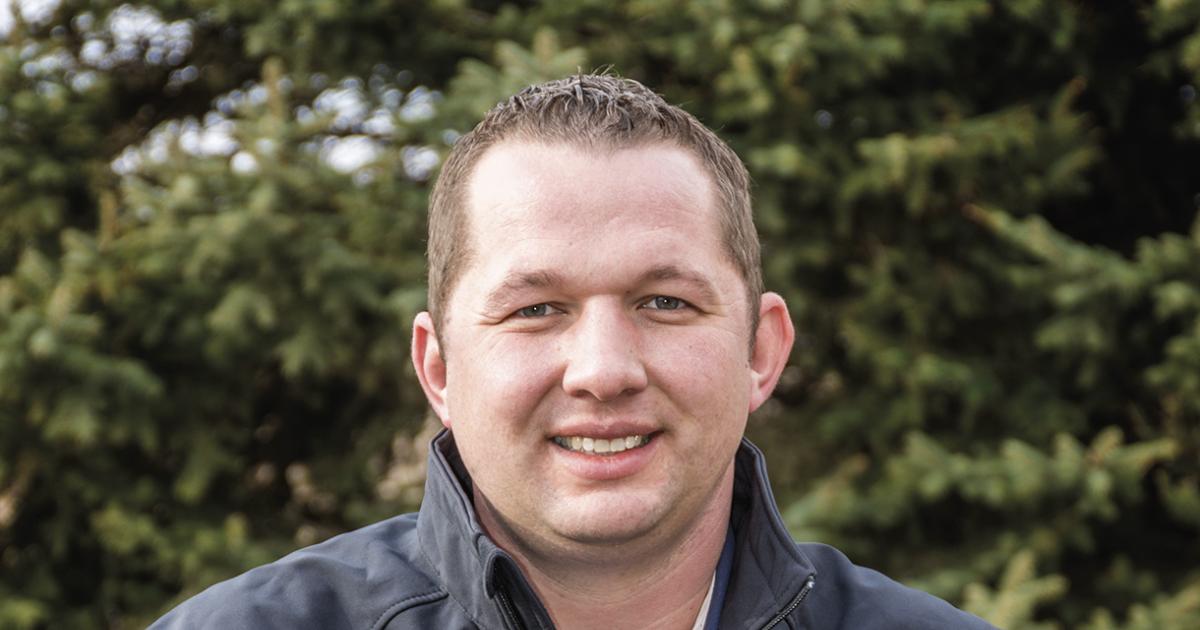The impact of members’ economic participation
It’s National Co-op Month! A time to celebrate cooperatives and their role in shaping and supporting the communities where we live, work and play.
While cooperatives operate in many industries and sectors of the economy, seven cooperative principles set them apart from other businesses: voluntary and open membership; democratic member control; members’ economic participation; autonomy and independence; education, training and information; cooperation among cooperatives; and concern for community.
To understand Cooperative Principle No. 3 – members’ economic participation – is to understand the depth of economic impact cooperatives make in their communities. Cooperative members have a personal financial stake in their cooperative – they own it. When the cooperative does well, the member benefits – and the community does, too!
Here’s how North Dakota’s electric cooperatives put this principle into practice.

CAPITAL CREDITS
It pays to be a member of an electric co-op.
Each year, electric co-ops allocate excess revenue, or margins, to members as capital credits. The allocation is based on the member’s electric usage for that year. When the co-op’s financial condition permits, capital credits are retired and returned to members through cash payments.
Since 2019, Mountrail-Williams Electric Cooperative (MWEC) has returned more than $10 million to its members in capital credits each year. In 2022, the co-op reached a new height, paying $13.7 million to its members.
“We are operating from a position of strength. We have a strong balance sheet, we generate cash flow, and we are an essential business providing a mission-critical product, electricity,” MWEC General Manager Dale Haugen says. “MWEC is proud to return capital credits to its members.”
Collectively, North Dakota’s local electric cooperatives have returned more than $637 million in capital credits to their members.
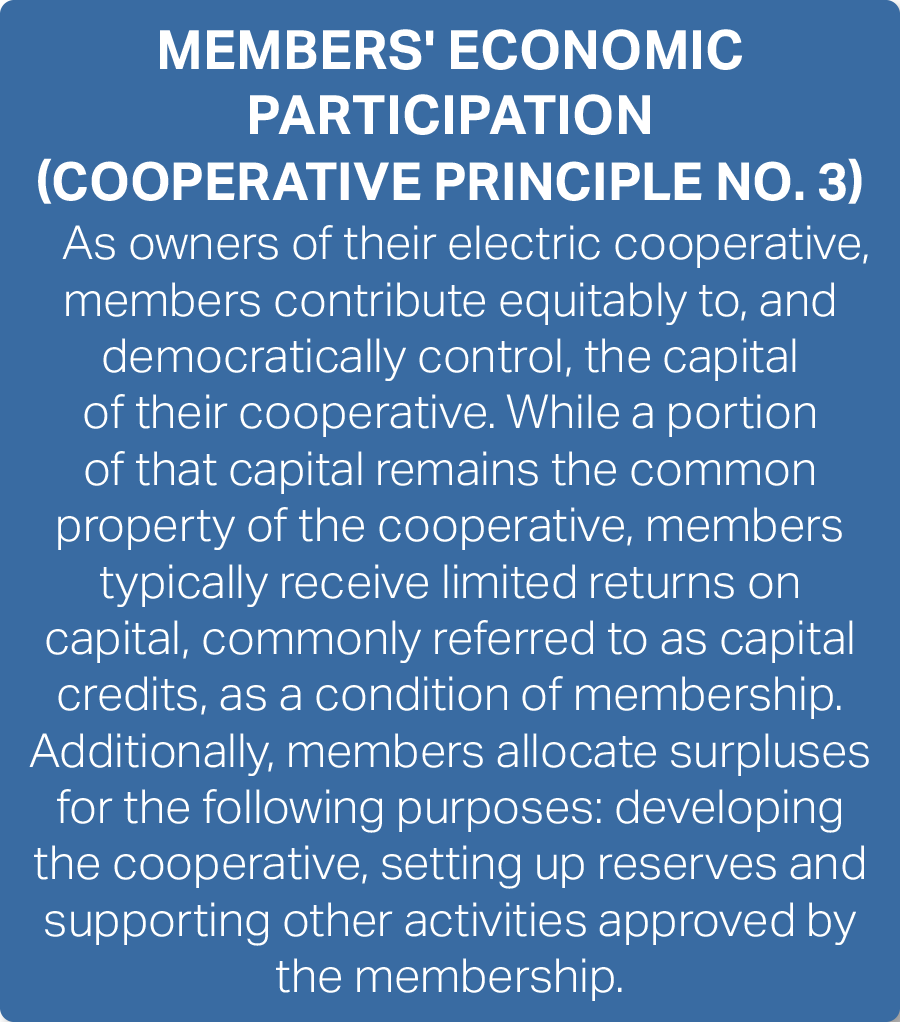
RURAL DEVELOPMENT
North Dakota’s electric cooperatives show concern for the communities they serve and support efforts to improve their members’ quality of life. One of the ways this is accomplished is with rural development initiatives. Through grant programs and low-interest financing, electric cooperatives support a variety of projects each year, including local emergency services, child care centers, grocery stores and more.
In 2019, LaMoure was facing a critical challenge – young families were leaving the community due to the lack of reliable, affordable child care. As a result, the school and local businesses were struggling to attract and retain employees, and the town was losing its young, energetic leaders.
That same year, the LaMoure Community Development Corporation (LCDC) called a community meeting, and soon a coalition was formed. LCDC, the LaMoure School District and Little Loboes Bright Beginnings, a newly formed nonprofit, set plans in motion for a new day care and preschool facility. Dakota Valley Electric Cooperative (DVEC) was there to help.
“At DVEC, we understand how difficult it can be to keep families, businesses and services in our small towns and rural communities, because we live, work and raise families in these places, too,” says Michelle Berry, DVEC manager of member services and rates, who leads the co-op’s rural development efforts.
With the co-op’s support, Little Loboes Bright Beginnings secured $200,000 in crucial low-interest financing through the Rural Development Finance Corporation (RDFC), a nonprofit finance and development corporation whose member-owners include North Dakota’s electric and telecommunications cooperatives. The loan was combined with primary financing from a local bank and a generous contribution from a local donor, which enabled the community to construct a new child care and preschool center, creating jobs and providing child care for up to 60 children.
With three years of experience under their belt, the coalition partners and the parents, especially, are excited about the success of the new facility.
“Using programs available through RDFC, the Rural Electric and Telecommunications Development Center and our own revolving loan fund, we are proud to support efforts that provide vital services and improve our members’ quality of life,” Berry says.
Established in 2000, the DVEC Economic Development Fund, which has grown from a $120,000 grant to a $1.9 million fund, provides loans to new or expanding businesses at a 1% interest rate.
OPERATION ROUND UP
The Operation Round Up (ORU) program gives co-op members an opportunity to turn their spare change into positive change. The voluntary program allows members to round up their monthly utility bill to the nearest dollar and donate their pennies to a charitable trust. The money pools and accumulates, and an elected board of co-op members reviews grant applications to determine the best use of those pennies.
Through the support of its members, North Dakota’s electric cooperatives have awarded more than $10.6 million in ORU grants, supporting local communities and nonprofits, and assisting with medical expenses for those in need.
Since launching its ORU program in 1998, Northern Plains Electric Cooperative (NPEC) has raised $926,687, which has benefited 1,265 charitable causes. Today, 80% of the co-op’s members elect to contribute to the fund.
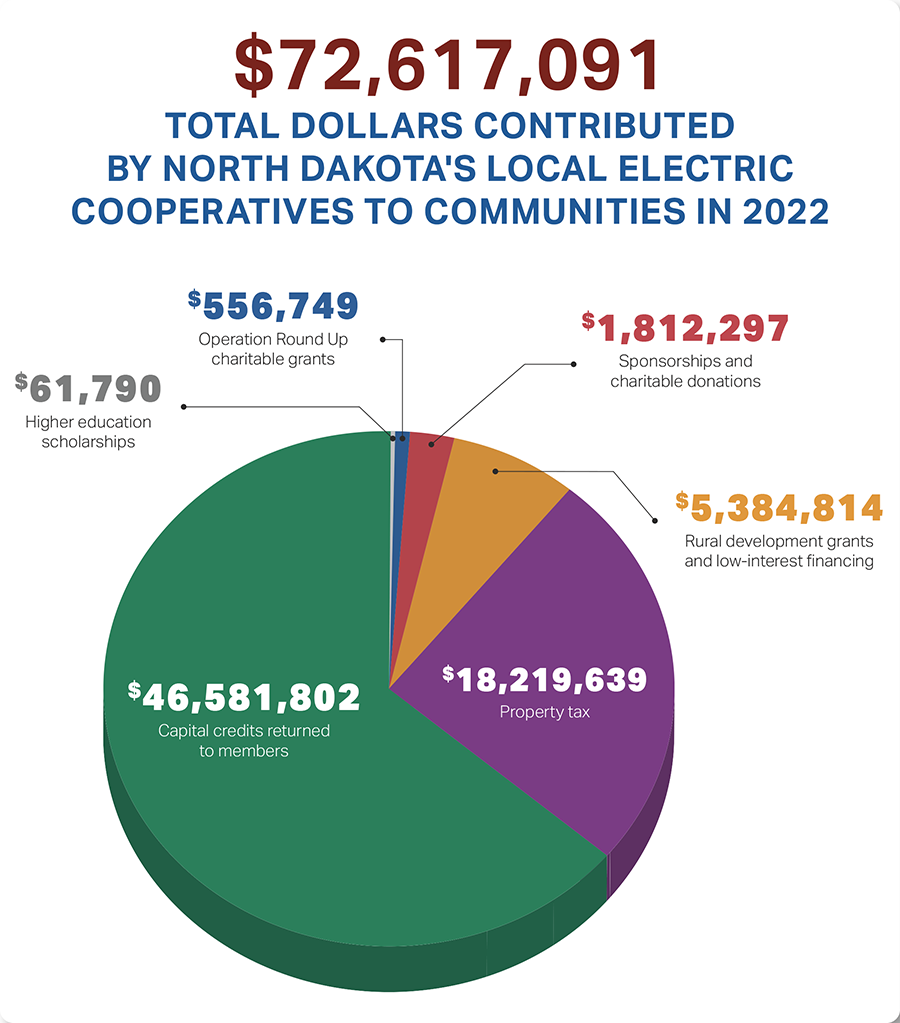
“This program wouldn’t exist without the support of our members. By giving a few pennies each month, they help make a big impact in our communities and in the lives of those less fortunate,” says Brittnee Wilson, NPEC.
While the charitable causes benefiting from the program vary from year to year, a few grant recipients remain the same. Every year, NPEC’s ORU board dedicates funds to food banks and backpack programs in 11 counties. Nearly 300 kids in the co-op’s service area benefit from their local backpack program, which provides children with backpacks of healthy, easy-to-prepare meals for weekends and school breaks.
SCHOLARSHIPS
North Dakota’s electric cooperatives recognize today’s students are tomorrow’s leaders and support scholarship programs for youth to pursue higher education.
As part of its commitment to community and area youth, Roughrider Electric Cooperative was proud to award 16 academic scholarships totaling $8,500 in 2023. The co-op committed $7,000 to provide one $500 scholarship to a student at each of its nine area high schools, one $500 at-large scholarship and four $500 luck-of-the-draw scholarships. The remaining $1,500 was provided by the co-op’s power supplier, Basin Electric Power Cooperative, and 3C Construction.
Each year, Basin Electric provides each of its member-cooperatives with a $1,000 scholarship for children of cooperative members and employees. One of the largest electric generation and transmission cooperatives in the United States, Basin Electric provides more than 130 academic scholarships each year, benefitting members in nine states.
Roughrider Electric also awards scholarships on behalf of 3C Construction and West Dakota Utility Services (WDUS). Each year, the co-op awards a $500 scholarship, sponsored by 3C Construction, to a student attending a lineworker program. Another $500 scholarship, sponsored by WDUS, is available for students enrolled in a mechanic program.
“Roughrider Electric Cooperative encourages and recognizes the academic achievements of its members and their dependent children,” says Brad Quenette, Roughrider Electric member services manager. “Our board of directors is committed to developing the next generation of leaders by helping them obtain a higher education.”
Collectively, North Dakota’s electric cooperatives awarded nearly $62,000 in higher education scholarships to North Dakota students in 2022.
SPONSORSHIPS AND DONATIONS
Electric cooperatives also support quality of life initiatives through sponsorships and charitable donations.
Each year, Mor-Gran-Sou Electric Cooperative receives requests to assist community organizations with a variety of projects or events. Cooperative donations range from raffle prizes to money to defray expenses.
In 2022, the co-op donated money to Northern Lights Dairy, a 600-cow facility near Mandan, to help defray expenses for its Breakfast on the Farm event. The free event, which included a petting zoo, hayrides and face painting, provided families with a fun-filled and educational day on the farm, where they learned about the farm operation and where milk comes from. Co-op employees also set up a booth to answer questions.
Mor-Gran-Sou Electric is a proud sponsor of many events held in the counties it serves – Morton, Grant and Sioux – and supports other activities and events with neighboring cooperatives, including performances by the Medora Burning Hills Singers.
“Reviewing and awarding requests for donations is a bonus I receive working at the cooperative,” says Julie Armijo, Mor-Gran-Sou Electric member services manager. “It is exciting to deliver the good news of an award for a worthy cause that impacts the communities we serve and live in.”
PROPERTY TAX
Electric cooperatives also contribute economically to their communities through tax payments, referred to under North Dakota tax code as “taxes in lieu of property taxes.”
“I think there is a misnomer that there isn't a tax structure that applies to electric cooperatives, but that's simply not true. They contribute greatly to local economies through the different taxes that are paid,” says North Dakota State Tax Commissioner Brian Kroshus. “Instead of the traditional property tax structure, cooperatives pay amounts based on formulas for transmission, distribution and generation. And those dollars support local economies, as well. They provide funding for emergency services, the school system, street and road repair, community enhancements and a number of other things. So, the tax structure, while different, serves the same purpose.”
In 2022, North Dakota’s electric cooperatives paid more than $12.8 million in property taxes.
These examples provide a mere snapshot of the impact cooperatives make in their communities. With members’ economic participation, electric cooperative contributions ripple through the economy, creating lasting economic value for communities, the state and country.
Krista Rausch is a communications specialist for the North Dakota Association of Rural Electric Cooperatives. She can be reached at krausch@ndarec.com.


